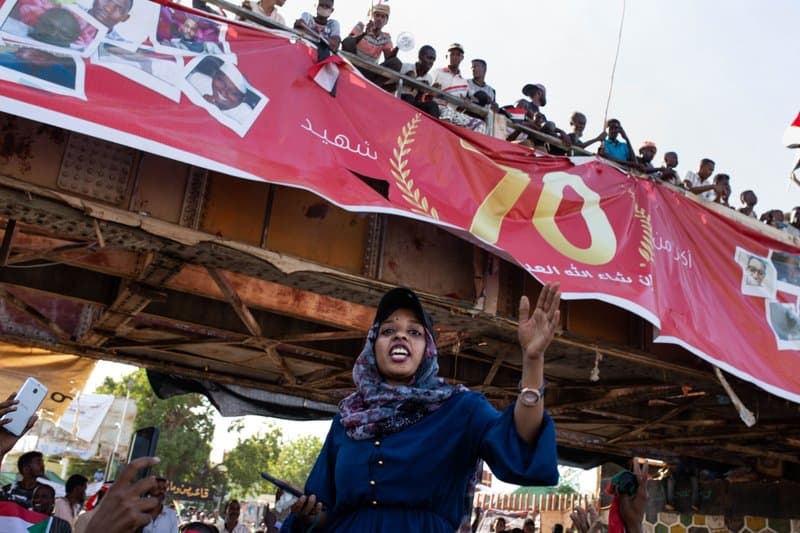YAOUNDÉ, Cameroon – After 30 years of facing discrimination and persecution, most Catholics in Sudan are glad to see the back of President Omar al-Bashir.
Last week, Sudan’s military ousted al-Bashir following four months of street protests against his rule, then appointed a military council it says will rule for no more than two years while elections are organized.
“In general, whenever a brutal dictator is deposed, there is hope for improvement,” Edward F. Clancy of Aid to the Church in Need (ACN) told Crux.
“It will be good news if the Christians are protected in the new government and if the people have religious freedom. It will be good news if the Christian minority is afforded the opportunity to live and work freely,” he said.
The deposed leader had come to power in a coup in the summer of 1989. He allied himself with the National Islamic Front and began implementing Sharia law in most of the country.
During his rule, al-Bashir faced numerous ethnic rebellions including in the Darfur region and in the mostly Christian south, which successfully seceded from Sudan to become South Sudan in 2011.
Clancy said the “vestiges of Sharia law” need to be abolished, “as it will perpetuate two systems of justice where Christians will always be second class citizens.”
The Sudanese Professionals Association, which spearheaded the protests that led to al-Bashir’s ouster, has called for the dismissal of all top judges and prosecutors among a package of demands. Those include the prosecution of those behind the Islamist-backed military coup in 1989, the dissolution of all pro-government unions and a freeze on the assets of top officials in al-Bashir’s government.
At one point, Christians made up nearly 10 percent of Sudan’s population, but after the partition of the country, they are fewer than 2 percent. Many of the Christians in Sudan were originally from the area that is now South Sudan.
Clancy said the Church in Sudan under al-Bashir was one of survival, with believers boldly living their faith in a deadly culture.
“The Sudanese Church was a church of survival in the face of oppression. In spite of these hardships, the Church has endured. The dioceses have continued to be the voices of peace and dialogue. In spite of great hardships, the Church has remained strong and shown the resilient strength needed to survive,” he told Crux.
Al-Bashir is the subject of two international arrest warrants issued by the International Criminal Court (ICC), which accused him of organizing war crimes and crimes against humanity in Sudan’s Darfur region between 2003 and 2008. The transitional military leadership has already said it will not extradite him to the ICC, a decision Clancy questioned.
“We do not know what internal political conditions that would justify Bashir this safe haven,” he said. “We’d hope that he does have the opportunity to answer for his actions.”
Clancy said al-Bashir must face trial, or there will never be “a closing of this chapter.”
“The military has guaranteed that there will be transition to a civilian government. Perhaps at that time Mr. Bashir will be handed over for trial,” he said.
He called on Christians to pray that the new leadership lives up to its promises, and allows for “a smooth transition of power” and expressed hope that the future government will protect the people of Sudan and move the nation in a direction of peace and prosperity.
Clancy called on the international community to “exert positive pressure on the new regime to put in fundamental protections for the people of Sudan.”
“Many a dictator has been removed from power only to see the replacement is no better or even worse than the predecessor. The recent history of Egypt comes to mind,” he said.
But he added the ultimate solution comes from constitutional reforms that should guarantee the rights of all to freedom of worship, not only Muslims.
“Constitutional guarantees of freedom of religion and freedom of speech are needed. Minorities and the Muslim majority must be seen as equals in the law. Sharia law must not be written into or influence national or local law. Muslims can exist in freedom in a society without Sharia law, but Christians do not have that freedom with Sharia,” Clancy told Crux.
But just shifting laws without a fundamental shift in mindsets could still be a problem for the promise of the country.
Britain’s Lord David Alton, a long-time campaigner for human rights in Sudan, said the international community “must not be shy in holding the new rulers in Khartoum to account.”
In a statement, he said the hallmark of al-Bashir’s “genocidal rule” has been the persecution of Christians and the “merciless ethnic cleansing” of black African Sudanese citizens.
“Until the transitional authorities in Khartoum distance themselves from the fundamentalist Islamism of the past 30 years, there is no guarantee the Sudanese will enjoy a peaceful, free and prosperous future. The international community must demand that Sudan abides by its commitments to the Universal Declaration of Human Rights to which it is a signatory,” he said.
This article incorporated material from the Associated Press.















